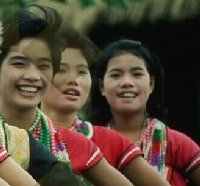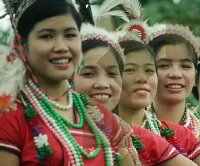
Out of Taiwan's
total populations of 21.3 millions, there are more than three hundred and fifty
thousand who are indigenous tribal peoples. Distinguished from the majority
Han Taiwanese, indigenous tribal groups are part of the so-called Malayo-Polynesians.
Linguistically, they are recognized as sub-groups of the Austronesian-speaking
family. Therefore they are also called the Austronesians. Despite the fact that
their languages are derived from the same root, the languages they currently
speak are not mutually comprehensible between groups. All indigenous tribal
groups are generally known and officially recognized as the Indigenous Peoples
of Taiwan.
Some Taiwanese anthropologists refer to them as the earliest inhabitants of
Taiwan. They themselves prefer to be addressed by their tribal names. They are
the:

Mountain will always be mountain
Indigenous Poeple will always be Indigenous People
Wherever you go, wherever you end up
Indigenous People will always be Indigenous People
Homesick
by Chanien (Puyuma)
Isn't
it true that only when one departs, does one feel homesick?
Although I am still standing on this land I called home,
no pre-warning,
I become emotionally furious and have no peace.
Because my father had once said to me:
"This land used to be our land........"

Really Want To Go Home
by DagaNow (Paiwan/Rukai)
Indigenous
Peoples straying in the city
Do not have much luxury to dream
Blood with special mark flowing in the body
Do not know if tomorrow will still be the same
Indigenous Peoples living under uncertainty
Wounded souls want to go back to their homeland
Have been reluctantly in disguise for so long
Do not know if tomorrow will still be the same
Really want to go home
Really want to go home
At the end, Indigenous Peoples are all the same
Young men earn their livings in city factories
Young girls are forced into prostitution
Realized that life is no easy task
Do not know if tomorrow will still be the same
What will be the future for Indigenous Peoples
To speak of it made my heart feel sore
Ask for the answer made my heart go panic
Do not know if tomorrow will still be the same
Really want to go home
Really want to go home
At the end, Indigenous Peoples are all the same.
by: Rebecca C. Fan
![]() Return to Indigenous Peoples' Literature
Return to Indigenous Peoples' Literature
Compiled by
Glenn Welker
This page last updated 11/24/2013 19:21:38
This site has been accessed 10,000,000
times since February 8, 1996.